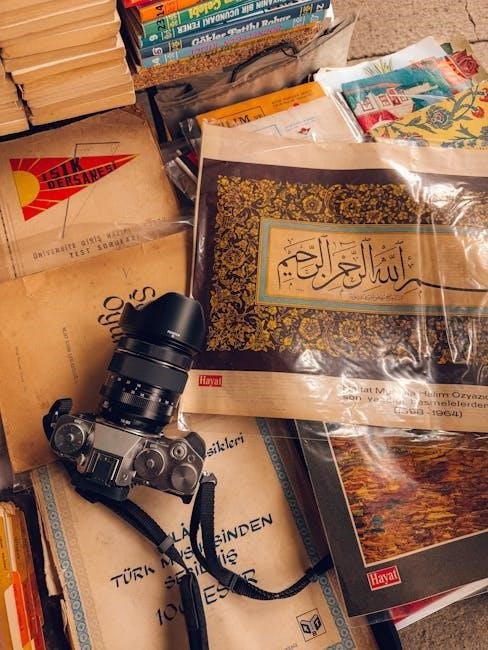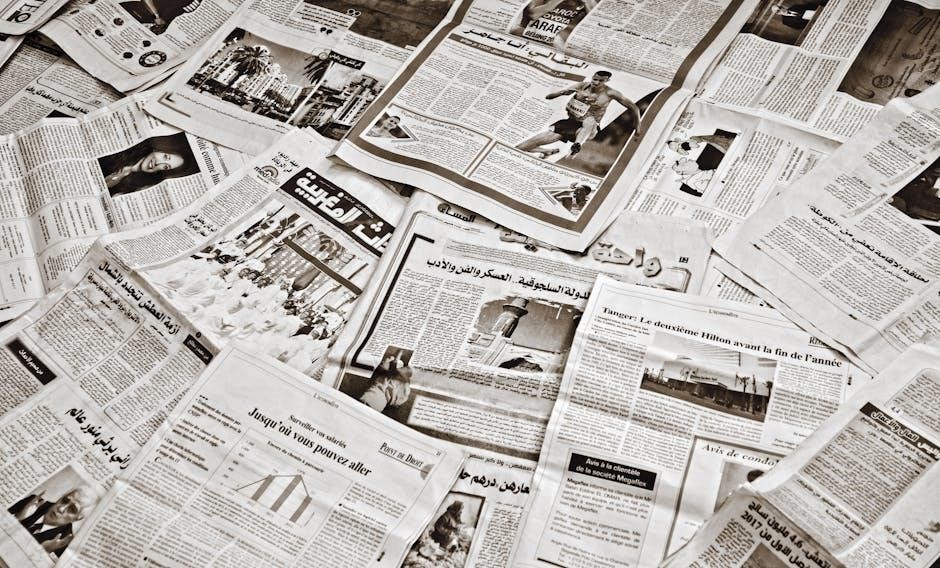Media Arabic is the language of news and current events, crucial for understanding the Arab world. This guide provides essential vocabulary for learners, covering politics, military, economics, and more, with transliteration for easy comprehension. Designed for intermediate to advanced learners, it bridges the gap between classroom learning and real-world application, making Arabic media accessible and engaging.
What is Media Arabic?
Media Arabic refers to the specialized language used in Arabic news media, including newspapers, television, and online platforms. It is designed to convey information clearly and concisely, often focusing on political, economic, and social issues. This form of Arabic is tailored for public consumption, making it essential for understanding current events in the Arab world. The vocabulary is distinct, with terms specific to journalism, such as “peace-keeping forces” and “economic sanctions.” Media Arabic is structured to be accessible, yet formal, ensuring accuracy and clarity in reporting. It is a vital tool for journalists, diplomats, and anyone needing toStay informed about regional developments. The guide “Media Arabic: An Essential Vocabulary” provides a comprehensive list of such terms, aiding learners in mastering this critical form of communication.

Why is Media Arabic Important?
Media Arabic is crucial for understanding the Arab world, as it is the language of news, politics, and current events. It enables learners to engage with real-world content, such as news articles and broadcasts, providing insights into regional issues. The vocabulary is tailored for clarity and precision, making it indispensable for journalists, diplomats, and scholars. Given the Arab world’s global influence, proficiency in Media Arabic is essential for professionals needing to stay informed. It also bridges cultural gaps, fostering international communication. The guide “Media Arabic: An Essential Vocabulary” addresses the growing demand for this specialized language, offering a structured approach to mastering its unique terminology and applications.
Who Can Benefit from Learning Media Arabic?

Media Arabic is an invaluable resource for various professionals and learners. Students of Arabic seeking to advance their language skills will find it particularly useful, as it bridges the gap between classroom learning and real-world application. Journalists, diplomats, and military personnel benefit from its focus on political, economic, and military terminology. The guide is also essential for researchers analyzing Middle Eastern affairs and anyone needing to understand Arabic news and media. Its structured approach makes it accessible to learners of all levels, from intermediate to advanced, ensuring practical and applicable knowledge. This vocabulary guide is a must-have for anyone aiming to engage effectively with Arabic media and current events.

Structure of the Media Arabic Vocabulary Guide
The guide is structured into key sections, including General, Politics, Elections, Military, Economics, and Law. It features transliteration and practice exercises to aid learners in mastering Media Arabic effectively.
Overview of the Guide
This guide is specifically designed for learners seeking to master Media Arabic, the language used in news and media across the Arab world. It provides a comprehensive yet accessible vocabulary list tailored for students, journalists, diplomats, and professionals. The guide is structured into thematic sections, covering essential topics such as politics, military, economics, and law. Each section includes key terms, phrases, and expressions commonly encountered in Arabic media, along with transliterations to aid pronunciation. The guide also incorporates contextual learning strategies, practice exercises, and reviews to reinforce understanding and retention. By bridging the gap between intermediate learning and real-world application, it equips learners with the tools to engage confidently with Arabic news and discussions. Its clear and structured approach makes it an invaluable resource for anyone aiming to enhance their proficiency in Media Arabic.
Vocabulary Categories
The guide categorizes vocabulary into key areas relevant to media discourse, ensuring a focused and organized learning experience. Categories include political terminology, military and defense terms, economic and financial vocabulary, and legal expressions. Each category is carefully curated to reflect the language used in contemporary Arabic media, providing learners with practical and applicable terms. Transliterations are included to facilitate pronunciation, while contextual examples help learners understand usage. The guide also covers essential phrases for news reporting, such as peacekeeping forces, economic sanctions, and conflict resolution. By organizing vocabulary thematically, the guide enables learners to build a strong foundation in Media Arabic, making it easier to engage with real-world news and discussions effectively.
Learning Features and Tools
The guide incorporates essential learning tools to enhance mastery of Media Arabic. It features transliteration for accurate pronunciation and contextual learning to help students grasp vocabulary in real-world scenarios. Practice exercises and regular reviews after every four lessons reinforce retention, with increasing difficulty to match expanding vocabulary. The guide also includes reading comprehension strategies and structured vocabulary lists, ensuring a comprehensive approach. By avoiding subjective language and focusing on practical terms, it equips learners with the tools needed to engage effectively with Arabic media. These features collectively create a robust framework for progressing from intermediate to advanced levels of Media Arabic proficiency.
Key Vocabulary Topics in Media Arabic
Media Arabic focuses on critical areas like politics, military, economics, and law. These topics provide essential terms for understanding news and discussions, making it a valuable resource for learners.
Political Vocabulary
Political vocabulary in Media Arabic is crucial for understanding news and discussions about governance, diplomacy, and international relations. Key terms include الامم المتحدة (the United Nations), قوات حفظ السلام (peacekeeping forces), and عقوبات اقتصادية (economic sanctions). Additionally, verbs like تشاور (to consult), شكل (to form, as in forming a government), and استقالة (to resign) are frequently used. This vocabulary is essential for translating and comprehending political statements, treaties, and policies. Mastery of these terms enables learners to engage with complex political discourse in Arabic media effectively, making it a cornerstone of the essential vocabulary guide.
Military and Defense Terms
Military and defense terms are a critical component of Media Arabic, essential for understanding conflicts, strategies, and operations. Key terms include حرب (war), غزو (invasion), and تحالف (alliance). Verbs like شكل (to form, as in forming a military unit) and استقالة (to resign, often used in military contexts) are also vital. Additionally, terms such as فدائي (freedom fighter) and مسلح (armed) are frequently encountered. These terms are often used in news reports to describe military operations, peacekeeping missions, and defense policies. Mastery of this vocabulary is essential for learners to grasp military-related news and discussions in Arabic media effectively, making it a fundamental part of the essential vocabulary guide.
Economic and Financial Vocabulary
Economic and financial vocabulary is crucial for understanding news related to trade, markets, and policies in Arabic media. Essential terms include اقتصاد (economy), تجارة (trade), and استثمار (investment). Verbs such as تداول (to trade) and شان (to monitor market trends) are frequently used. Key concepts like نقد (currency), احتياطي (reserve), and الواردات (imports) are also essential. This vocabulary is often used in discussions about economic sanctions, trade agreements, and financial reforms. Mastering these terms helps learners comprehend economic developments and policies in the Arab world, making it a vital part of the essential vocabulary guide for Media Arabic.
Law and Order Terminology
Law and order terminology in Media Arabic is essential for understanding legal and security-related news. Key terms include قانون (law), شرطة (police), and محكمة (court). Verbs like حكم (to sentence) and investigate are crucial for discussions on trials and legal processes. Terms such as العدالة (justice), الجريمة (crime), and العقوبة (punishment) are frequently used. This vocabulary also covers security measures, with terms like الأمن (security) and الحفاظ (protection). Understanding these terms is vital for interpreting news on legal reforms, criminal cases, and law enforcement activities in the Arab world, making them a fundamental part of the essential vocabulary guide for Media Arabic learners.

Learning Strategies for Media Arabic
Effective learning strategies include contextual learning, using transliteration for clarity, and regular practice exercises. These methods enhance comprehension and retention of Media Arabic vocabulary and structures effectively.
Contextual Learning
Contextual learning is a powerful strategy for mastering Media Arabic. By immersing learners in real-world scenarios, such as news articles or broadcasts, vocabulary is presented within meaningful contexts. This approach enhances comprehension and retention, as students see words in their natural usage. It also helps bridge the gap between theory and practical application, making learning more engaging and effective. Contextual learning reduces reliance on rote memorization, allowing learners to grasp the nuances of Media Arabic more intuitively. This method is particularly effective for understanding complex terms and their variations in different political, economic, or military contexts, ensuring learners can apply their knowledge in real-life situations.
Using Transliteration for Better Understanding
Transliteration plays a vital role in facilitating the comprehension of Media Arabic, especially for non-native learners. By converting Arabic script into Latin characters, transliteration makes unfamiliar words more accessible. This tool is particularly useful for beginners who may struggle with the Arabic writing system. It helps in identifying pronunciation and understanding word structure, which are crucial for effective learning. Many resources, including the “Media Arabic: An Essential Vocabulary” guide, incorporate transliteration to aid learners in mastering complex terminology. This approach ensures that learners can focus on meaning and context without being hindered by script barriers, making their journey into Media Arabic more straightforward and productive.
Practice Exercises and Reviews
Practice exercises and regular reviews are essential for mastering Media Arabic vocabulary. The guide incorporates a variety of exercises, such as multiple-choice questions, fill-in-the-blank activities, and sentence completion tasks. These exercises are designed to reinforce learning and ensure retention of key terms. Reviews are strategically placed after every few lessons, increasing in length as the vocabulary progresses. This structured approach helps learners gradually build their proficiency. Additionally, the guide encourages active engagement with the material through practical applications, such as translating sentences and understanding context. By integrating these exercises, learners can systematically improve their ability to use Media Arabic effectively in real-world scenarios, ensuring a solid foundation for advanced studies or professional applications.

Resources for Media Arabic Learners
Key resources include Media Arabic: An Essential Vocabulary, offering structured lessons and exercises. Online platforms and Arabic news outlets like Al Jazeera and BBC Arabic provide real-world application.
Recommended Books and Guides
Media Arabic: An Essential Vocabulary by Elisabeth Kendall is a cornerstone resource, providing a structured approach to mastering the language of Arabic media. This comprehensive guide offers categorized vocabulary lists, transliteration, and practice exercises, making it ideal for learners of all levels. Designed to bridge the gap between intermediate learning and real-world application, it covers critical areas such as politics, economics, and law. Supplementary books like Arabic Media Dictionary and Practice Makes Perfect: Arabic Verb Tenses further enhance vocabulary acquisition. These resources are tailored for students, journalists, and professionals seeking to improve their understanding of contemporary Arabic news and discussions. They offer practical tools for effective learning and real-world application.
Online Platforms for Practice
Several online platforms offer valuable resources for mastering Media Arabic. Websites like Perlego provide access to eBooks such as Media Arabic: An Essential Vocabulary, enabling learners to study comprehensive guides digitally. The Internet Archive hosts downloadable PDFs of vocabulary lists and practice materials, including Media Arabic An Essential Vocabulary. Additionally, platforms incorporating interactive exercises, quizzes, and real-world media content help learners engage with the language dynamically. These tools are designed to enhance vocabulary retention and application, making them indispensable for students and professionals alike seeking to improve their proficiency in Media Arabic.

News Outlets for Real-World Application
Engaging with authentic Arabic news outlets is crucial for applying Media Arabic skills. Platforms like Galatz (Israeli army radio), Yedioth Ahronoth, Ynet, and Haaretz provide diverse perspectives and real-world content. These outlets cover current events, politics, and regional issues, offering learners exposure to contemporary vocabulary and journalistic styles. Additionally, Al Jazeera and BBC Arabic are invaluable resources, delivering news in clear, formal Arabic. By following these sources, learners can enhance their comprehension of Media Arabic, familiarize themselves with regional dialects, and stay updated on global and Middle Eastern affairs. Regular engagement with these platforms helps bridge the gap between theoretical learning and practical application, making them indispensable for proficient Media Arabic acquisition.

Challenges in Learning Media Arabic
Learning Media Arabic involves mastering complex, evolving vocabulary and understanding coinages not found in standard Arabic. The gap between formal Arabic and media-specific terminology presents a significant hurdle, requiring constant adaptation to new linguistic developments and regional variations.
Complex Vocabulary and Coinages

Media Arabic presents learners with complex vocabulary and coinages that often differ from standard Arabic. These terms are frequently created to address contemporary issues, making them unfamiliar even to native speakers. The specialized nature of media terminology, such as political and military jargon, requires precise understanding and memorization. Additionally, the constant evolution of media language due to global events and regional variations adds to the challenge. Learners must adapt to new coinages and nuanced expressions, which are not typically found in traditional Arabic dictionaries. To master these terms, reliance on context and transliteration is essential, as well as regular exposure to real-world media content to stay updated with the latest linguistic developments.
Differences from Standard Arabic
Media Arabic differs significantly from standard Arabic due to its specialized vocabulary and formal style. It is tailored for news and media, incorporating unique terminology and expressions that are not commonly found in classical or modern standard Arabic. The language used in media is often more direct and concise, with a focus on clarity and precision. Additionally, Media Arabic includes a wide range of abbreviations, acronyms, and coinages that are specific to journalistic contexts. These differences make it essential for learners to study Media Arabic separately, as traditional Arabic resources may not cover the specialized terms and phrases used in news and broadcasts. This distinction highlights the need for focused study to master the nuances of Media Arabic effectively.
Keeping Up with Evolving Terminology
Media Arabic terminology is constantly evolving due to changing political, social, and technological landscapes. New coinages and expressions emerge regularly to describe contemporary events, making it essential for learners to stay updated. The dynamic nature of media language requires active engagement with current news and reliable sources. Learners can keep pace by regularly reviewing news outlets, dictionaries, and vocabulary lists tailored to Media Arabic. Additionally, understanding the context in which new terms arise helps in grasping their meanings effectively. This ongoing evolution underscores the importance of continuous learning and adaptation to master the ever-changing vocabulary of Media Arabic.
Practical Applications of Media Arabic
Mastering Media Arabic enables learners to read news articles, understand broadcasts, and translate content effectively. It enhances comprehension of political, economic, and social discussions in Arabic media, making learning practical and relevant.
Reading News Articles

Reading Arabic news articles is a fundamental skill for learners, enabling direct access to current events and cultural insights. Media Arabic: An Essential Vocabulary provides learners with the necessary tools to comprehend news content effectively. The guide includes vocabulary lists categorized by topics such as politics, economics, and law, which are frequently encountered in news contexts. Transliteration is provided for challenging terms, aiding pronunciation and recognition. Contextual learning strategies are emphasized, with words presented in sentences to enhance understanding and retention. This approach helps learners bridge the gap between intermediate language skills and the ability to engage with real-world Arabic media confidently. Regular practice with news articles reinforces vocabulary acquisition and improves reading comprehension, making it an indispensable resource for mastering Media Arabic.
Understanding Broadcast News
Understanding broadcast news in Arabic is crucial for engaging with real-time events and cultural nuances. Media Arabic: An Essential Vocabulary equips learners with the necessary tools to comprehend televised and radio news broadcasts. The guide provides key terms and phrases commonly used in news segments, such as political discussions, military updates, and economic reports. Learners can benefit from transliteration aids, enabling them to recognize and pronounce unfamiliar words. The guide also offers contextual learning strategies, helping learners grasp the meaning of complex sentences and idiomatic expressions. By mastering the vocabulary and structures presented, learners can enhance their ability to follow live broadcasts and stay informed about global and regional developments. Regular exposure to broadcast news, combined with guided practice, fosters fluency and confidence in understanding Media Arabic.
Translating Media Content
Translating media content from Arabic requires precision and familiarity with specific terminology. Media Arabic: An Essential Vocabulary offers a comprehensive resource for learners to accurately translate news articles, broadcasts, and official statements. The guide provides lists of key terms organized by category, such as politics, military, and economics, along with their English equivalents. Transliteration is included to aid in pronunciation and understanding. Learners can practice translating sentences and short passages, gradually building proficiency. The guide’s structured approach ensures that users can confidently handle complex media texts, making it an invaluable tool for students, journalists, and professionals. Regular practice exercises reinforce vocabulary retention and improve translation accuracy, enabling learners to effectively convey the meaning of Arabic media content in English.
Media Arabic: An Essential Vocabulary is a vital resource for mastering Arabic media language, offering a comprehensive guide to enhance understanding and application of contemporary Arabic news and discussions.
Final Thoughts on Media Arabic
Media Arabic: An Essential Vocabulary is a cornerstone for anyone seeking to master the language of Arabic news and media. It provides a structured approach to learning, offering key terms and phrases that are indispensable for understanding contemporary Arabic news. The guide is particularly valuable for students, journalists, diplomats, and military personnel, as it bridges the gap between intermediate learning and real-world application. By focusing on essential vocabulary across various domains such as politics, economics, and law, it equips learners with the tools needed to engage effectively with Arabic media. The inclusion of transliteration and contextual learning strategies ensures that learners can grasp and retain the material efficiently, making it an indispensable resource for anyone serious about mastering Media Arabic.
Encouragement for Continued Learning
Mastery of Media Arabic is a rewarding journey that opens doors to understanding the Arab world’s news, politics, and culture. Learners are encouraged to embrace consistent practice, as proficiency in this specialized vocabulary enhances both professional and academic opportunities. Utilize resources like Media Arabic: An Essential Vocabulary to build a strong foundation, and supplement learning with real-world applications, such as reading Arabic news articles or watching broadcast news. Regular review and contextual learning strategies will solidify retention. Stay motivated by celebrating progress and recognizing the growing importance of Arabic in global communication. With dedication, learners can overcome challenges and achieve fluency in Media Arabic, unlocking a wealth of opportunities for deeper engagement with the Arab world.
